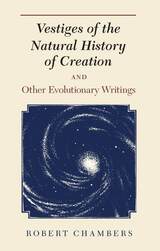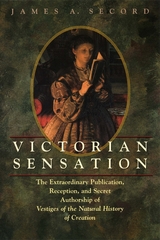2 books about Natural History Creation

Vestiges of the Natural History of Creation and Other Evolutionary Writings
Robert Chambers
University of Chicago Press, 1994
Originally published anonymously in 1844, Vestiges proved to be as controversial as its author expected. Integrating research in the burgeoning sciences of anthropology, geology, astronomy, biology, economics, and chemistry, it was the first attempt to connect the natural sciences to a history of creation. The author, whose identity was not revealed until 1884, was Robert Chambers, a leading Scottish writer and publisher. Vestiges reached a huge popular audience and was widely read by the social and intellectual elite. It sparked debate about natural law, setting the stage for the controversy over Darwin's Origin. In response to the surrounding debate and criticism, Chambers published Explanations: A Sequel, in which he offered a reasoned defense of his ideas about natural law, castigating what he saw as the narrowness of specialist science.
With a new introduction by James Secord, a bibliography of reviews, and a new index, this volume adds to Vestiges and Explanations Chambers's earliest works on cosmology, an essay on Darwin, and an autobiographical essay, raising important issues about the changing meanings of popular science and religion and the rise of secular ideologies in Western culture.
With a new introduction by James Secord, a bibliography of reviews, and a new index, this volume adds to Vestiges and Explanations Chambers's earliest works on cosmology, an essay on Darwin, and an autobiographical essay, raising important issues about the changing meanings of popular science and religion and the rise of secular ideologies in Western culture.
[more]

Victorian Sensation
The Extraordinary Publication, Reception, and Secret Authorship of Vestiges of the Natural History of Creation
James A. Secord
University of Chicago Press, 2000
Fiction or philosophy, profound knowledge or shocking heresy? When Vestiges of the Natural History of Creation was published anonymously in 1844, it sparked one of the greatest sensations of the Victorian era. More than a hundred thousand readers were spellbound by its startling vision—an account of the world that extended from the formation of the solar system to the spiritual destiny of humanity. As gripping as a popular novel, Vestiges combined all the current scientific theories in fields ranging from astronomy and geology to psychology and economics. The book was banned, it was damned, it was hailed as the gospel for a new age. This is where our own public controversies about evolution began.
In a pioneering cultural history, James A. Secord uses the story of Vestiges to create a panoramic portrait of life in the early industrial era from the perspective of its readers. We join apprentices in a factory town as they debate the consequences of an evolutionary ancestry. We listen as Prince Albert reads aloud to Queen Victoria from a book that preachers denounced as blasphemy vomited from the mouth of Satan. And we watch as Charles Darwin turns its pages in the flea-ridden British Museum library, fearful for the fate of his own unpublished theory of evolution. Using secret letters, Secord reveals how Vestiges was written and how the anonymity of its author was maintained for forty years. He also takes us behind the scenes to a bustling world of publishers, printers, and booksellers to show how the furor over the book reflected the emerging industrial economy of print.
Beautifully written and based on painstaking research, Victorian Sensation offers a new approach to literary history, the history of reading, and the history of science. Profusely illustrated and full of fascinating stories, it is the most comprehensive account of the making and reception of a book (other than the Bible) ever attempted.
In a pioneering cultural history, James A. Secord uses the story of Vestiges to create a panoramic portrait of life in the early industrial era from the perspective of its readers. We join apprentices in a factory town as they debate the consequences of an evolutionary ancestry. We listen as Prince Albert reads aloud to Queen Victoria from a book that preachers denounced as blasphemy vomited from the mouth of Satan. And we watch as Charles Darwin turns its pages in the flea-ridden British Museum library, fearful for the fate of his own unpublished theory of evolution. Using secret letters, Secord reveals how Vestiges was written and how the anonymity of its author was maintained for forty years. He also takes us behind the scenes to a bustling world of publishers, printers, and booksellers to show how the furor over the book reflected the emerging industrial economy of print.
Beautifully written and based on painstaking research, Victorian Sensation offers a new approach to literary history, the history of reading, and the history of science. Profusely illustrated and full of fascinating stories, it is the most comprehensive account of the making and reception of a book (other than the Bible) ever attempted.
Winner of the 2002 Pfizer Award from the History of Science Society
[more]
READERS
Browse our collection.
PUBLISHERS
See BiblioVault's publisher services.
STUDENT SERVICES
Files for college accessibility offices.
UChicago Accessibility Resources
home | accessibility | search | about | contact us
BiblioVault ® 2001 - 2024
The University of Chicago Press









